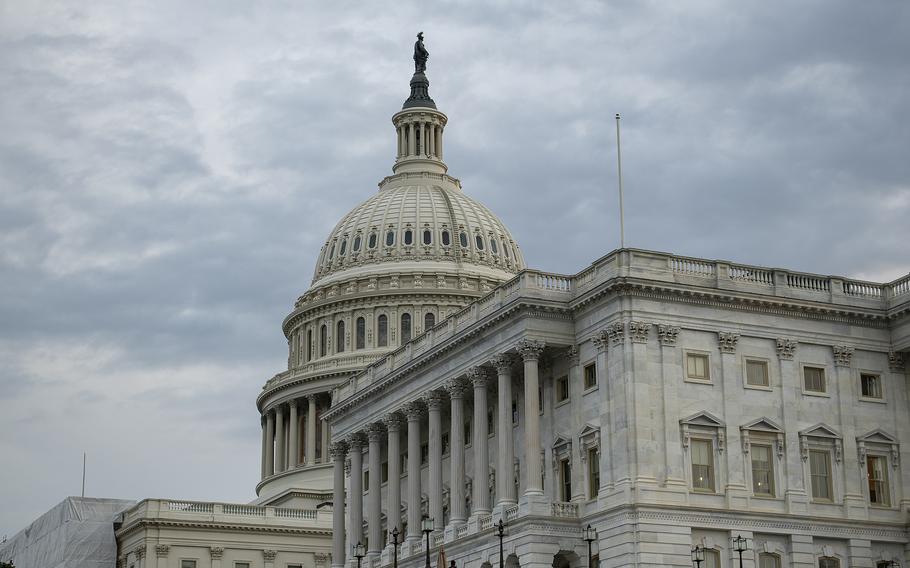
The U.S. Capitol as seen in Washington, D.C., on July 6, 2022. (Carlos Bongioanni/Stars and Stripes)
Junior enlisted troops would see a big pay raise in a proposed $826 billion defense spending bill for 2024 approved Thursday by Republicans on the House Appropriations Committee.
The Fiscal Year 2024 Defense Appropriations Bill, an annual must-pass law that funds the Pentagon and some intelligence agencies, would boost pay by an average of 30% for most troops below E-5, according to Republican appropriators. But the bill also includes efforts at aimed at ending several Pentagon policies that many conservatives have derided as “woke,” such as providing travel funds for troops seeking abortions and implementation of various diversity, equity and inclusion initiatives.
The bill would boost defense spending about $286 million above President Joe Biden’s 2024 budget request. It was approved — alongside funding bills for other parts of the federal government — by the House Appropriations Committee on Thursday in a 33-27 party line vote. The vote sends the bill to the full House for consideration.
The spending bill instructs the defense secretary to conduct an unprecedented overhaul of military pay tables for junior enlisted soldiers. It comes as the Pentagon has long struggled with poverty-level pay for its most junior troops, especially those with families. In 2019, for example, some 22,000 military service members qualified for federal food benefits, according to the Agriculture Department.
The bill would set base pay higher for most troops below E-5 and for some as high as E-6. For an E-2, it would increase monthly base pay from $1,917.63 to $2,799.20. It boosts pay for E-4s with six years of service from $3,039.15 per month to $3,210.30. It would also increase pay for E-5s with four or less years of service and E-6s with less than two years in the military.
The bill would also fund a 5.2% pay raise for all troops, which would come in addition to the increased base pay for junior enlisted troops mandated by the legislation.
But proposals within the bill that could block diversity policies at the Pentagon already are being challenged by House Democrats. More so, the bill in its current form might find even greater opposition in the Democrat-led Senate, and President Joe Biden, whose administration has placed a priority on promoting equity initiatives, could veto the legislation if it made it that far.
Democrats on Thursday railed against certain measures in the bill including proposals that would block funding climate-focused initiatives, prohibit medical procedures for transgender service members, block funds for any efforts deemed to “promote or advance Critical Race Theory,” and defund the position of deputy inspector general for diversity and inclusion and extremism in the military. The bill also would stop the Pentagon from providing expense reimbursement for troops who travel out of state for reproductive care, including abortions, after several states passed recent laws restricting the procedure.
Rep. Betty McCollum, D-Minn., said the bill attacks the LGBTQ+ community “with hateful provisions” and puts politics ahead of national security.
“It is regrettable that the Republican majority has produced a defense appropriations bill that would undermine our military’s readiness and leave us less secure in the world, not more,” McCollum, the top Democrat on the defense appropriations subcommittee, said Thursday. “Most disappointing of all, this bill contains the most extreme social policy riders I have ever seen in a defense appropriations bill. These riders make it almost impossible to gain bipartisan support. Our service members make immense sacrifices, along with their families, on behalf of our nation, and they deserve better from Congress.”
The Republican proposal also would ban the use of funds for “events on military installations or as part of recruiting programs that bring discredit upon the military,” including events involving drag queens. Military officials already have banned drag performances on military installations under pressure from some GOP members, Pentagon officials have said.
Republicans have argued such policies undermine military readiness. The House defense spending bill would ensure the Pentagon “focuses on its mission — not culture wars,” Rep. Ken Calvert, R-Calif., who is chairman of the defense appropriations subpanel, said Thursday.
“This bill rejects many of the Biden administration’s misguided funding proposals, such as climate change initiatives, far-left social policies and shrinking the Navy,” he said. “I ensured this bill provides significant oversight of the [Defense] Department’s request, resulting in approximately $20 billion in cuts that I have redirected to improve the lethality and readiness of the force.”
Democrats labeled the legislation a “non-starter” during the contentious House Appropriations Committee hearing Thursday.
Rep. Rosa DeLauro of Connecticut, the Democrat’s top appropriator, said the legislation amounted to a “messaging bill that [has] no future.”
The bill also would stop a $1 billion in Biden’s budget request for increasing the Pentagon’s civilian workforce. Instead, it would require the Defense Department to “reassess the number and roles of its civilian personnel.”
Calvert said the effort would produce “a more efficient and effective workforce.” McCollum argued the measure would “burden our service members with additional duties without finding meaningful savings.”
The Senate has yet to publish its proposed defense spending bill for fiscal 2024. Bills from both chambers of Congress must be reconciled and approved by Oct. 1, the start of the new fiscal year, to ensure the government can continue operating without a partial shutdown.